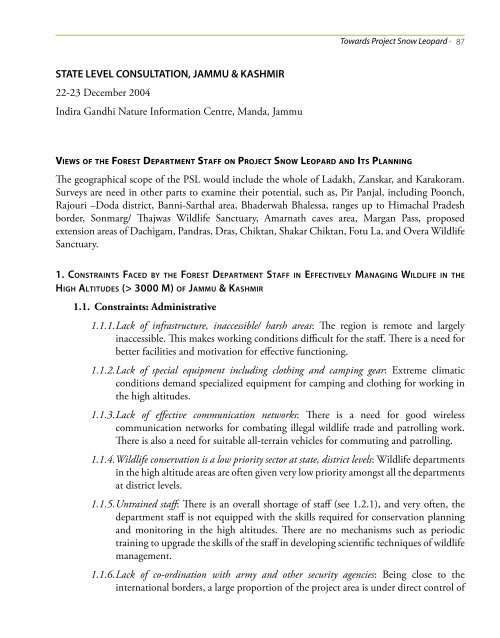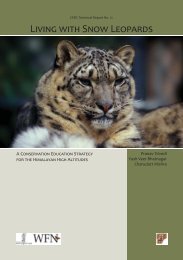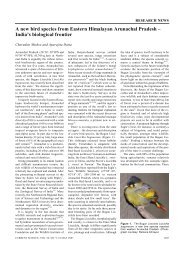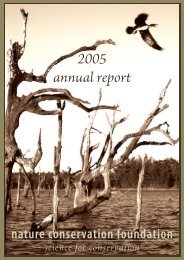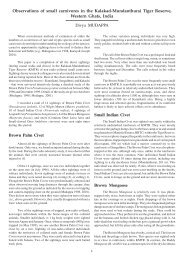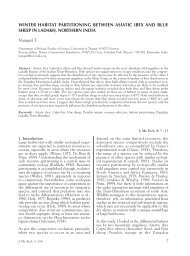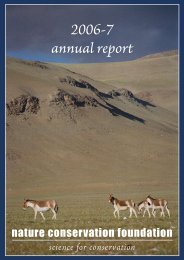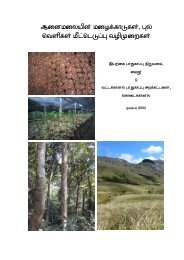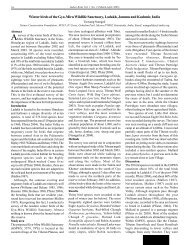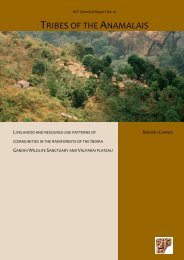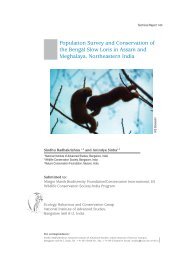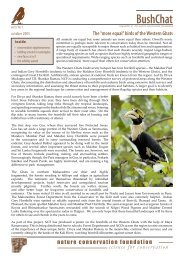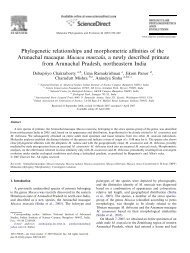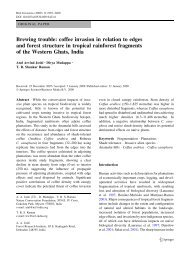towards project snow leopard - Nature Conservation Foundation
towards project snow leopard - Nature Conservation Foundation
towards project snow leopard - Nature Conservation Foundation
Create successful ePaper yourself
Turn your PDF publications into a flip-book with our unique Google optimized e-Paper software.
Towards Project Snow Leopard • 87<br />
STATE LEVEL CONSULTATION, JAMMU & KASHMIR<br />
22-23 December 2004<br />
Indira Gandhi <strong>Nature</strong> Information Centre, Manda, Jammu<br />
Views of the Forest Department Staff on Project Snow Leopard and Its Planning<br />
The geographical scope of the PSL would include the whole of Ladakh, Zanskar, and Karakoram.<br />
Surveys are need in other parts to examine their potential, such as, Pir Panjal, including Poonch,<br />
Rajouri –Doda district, Banni-Sarthal area, Bhaderwah Bhalessa, ranges up to Himachal Pradesh<br />
border, Sonmarg/ Thajwas Wildlife Sanctuary, Amarnath caves area, Margan Pass, proposed<br />
extension areas of Dachigam, Pandras, Dras, Chiktan, Shakar Chiktan, Fotu La, and Overa Wildlife<br />
Sanctuary.<br />
1. Constraints Faced by the Forest Department Staff in Effectively Managing Wildlife in the<br />
High Altitudes (> 3000 M) of Jammu & Kashmir<br />
1.1. Constraints: Administrative<br />
1.1.1. Lack of infrastructure, inaccessible/ harsh areas: The region is remote and largely<br />
inaccessible. This makes working conditions difficult for the staff. There is a need for<br />
better facilities and motivation for effective functioning.<br />
1.1.2. Lack of special equipment including clothing and camping gear: Extreme climatic<br />
conditions demand specialized equipment for camping and clothing for working in<br />
the high altitudes.<br />
1.1.3. Lack of effective communication networks: There is a need for good wireless<br />
communication networks for combating illegal wildlife trade and patrolling work.<br />
There is also a need for suitable all-terrain vehicles for commuting and patrolling.<br />
1.1.4. Wildlife conservation is a low priority sector at state, district levels: Wildlife departments<br />
in the high altitude areas are often given very low priority amongst all the departments<br />
at district levels.<br />
1.1.5. Untrained staff: There is an overall shortage of staff (see 1.2.1), and very often, the<br />
department staff is not equipped with the skills required for conservation planning<br />
and monitoring in the high altitudes. There are no mechanisms such as periodic<br />
training to upgrade the skills of the staff in developing scientific techniques of wildlife<br />
management.<br />
1.1.6. Lack of co-ordination with army and other security agencies: Being close to the<br />
international borders, a large proportion of the <strong>project</strong> area is under direct control of


